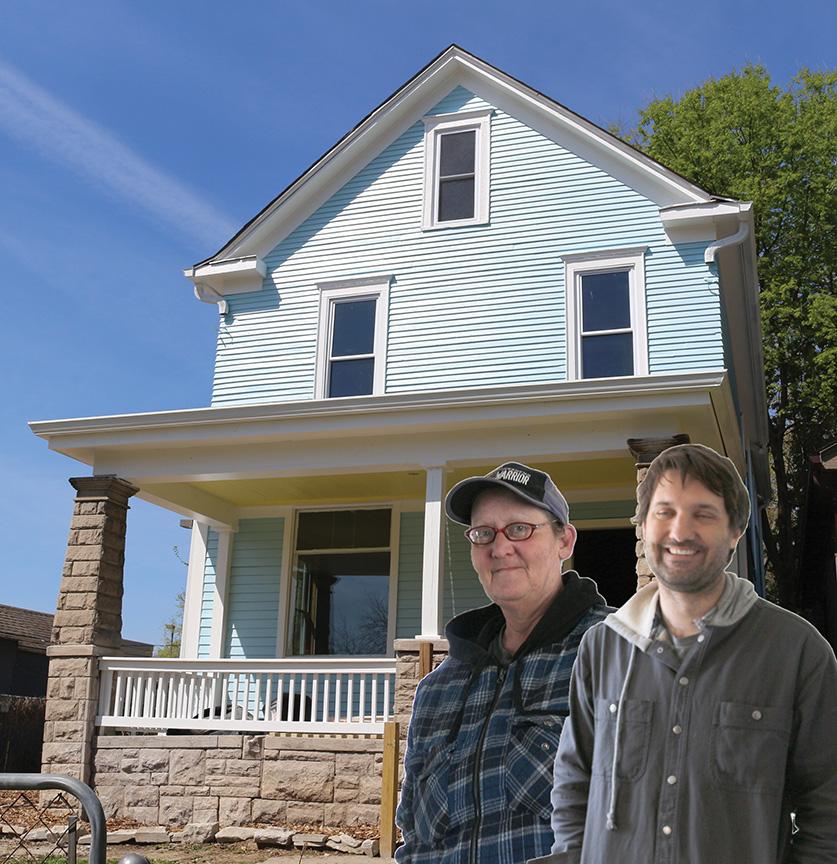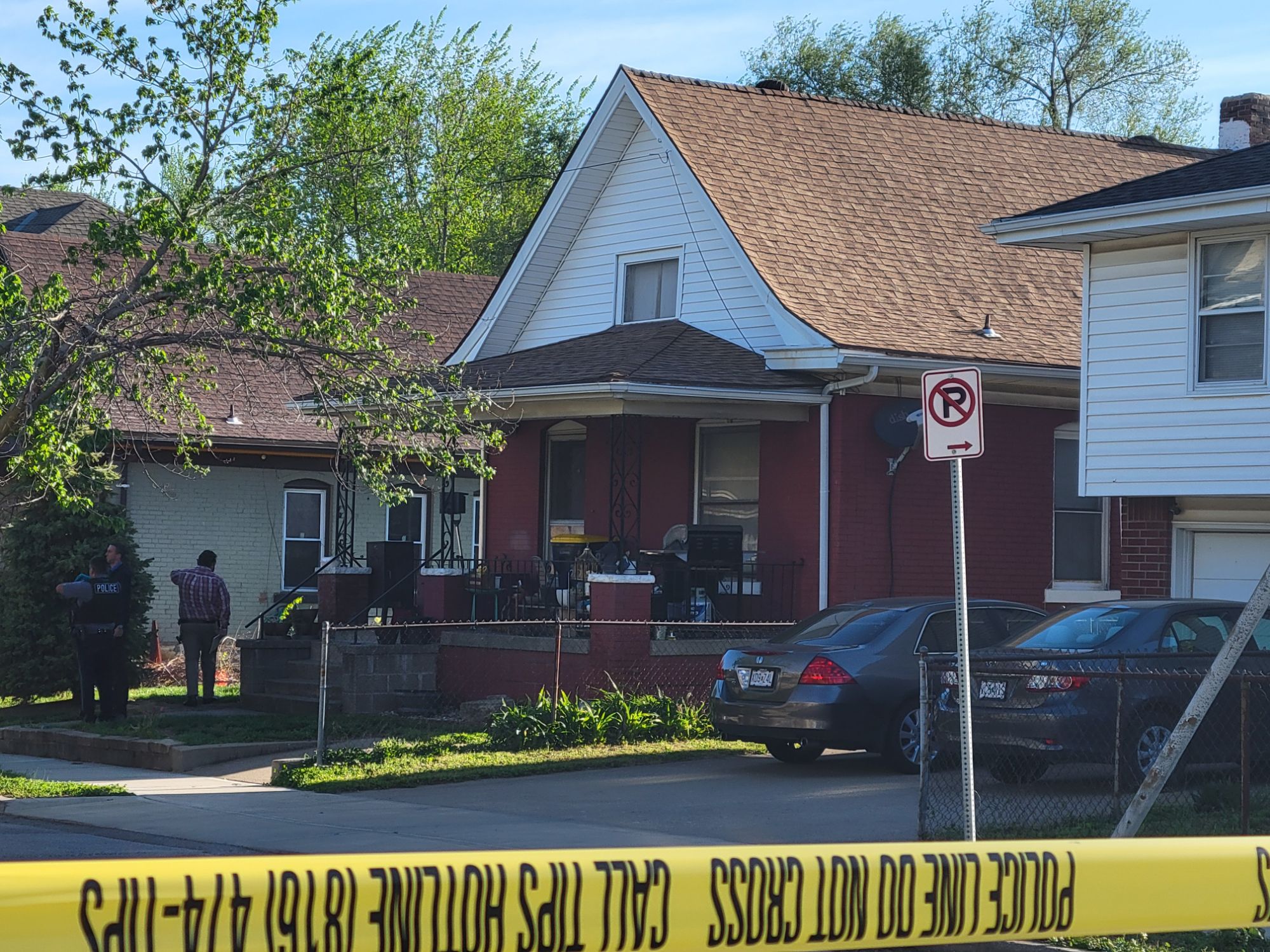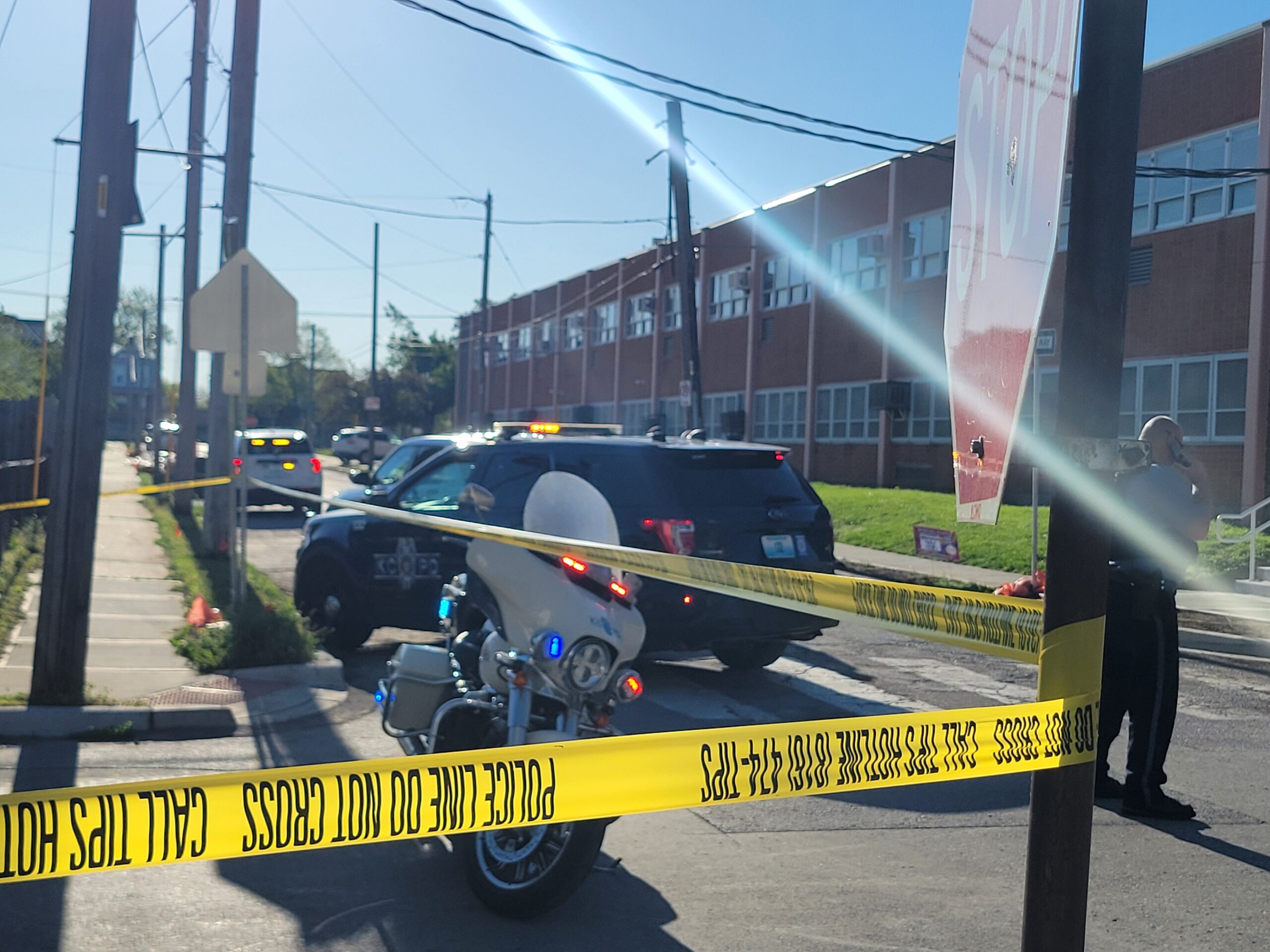
Abby Hoover
Managing Editor
An unassuming house in the 500 block of Drury Avenue just got a fresh coat of paint in a robin’s egg blue, with the underside of the front porch a sunny yellow. To passersby, this house may look like one of the many remodeling projects making progress in Northeast. But to Tina Farber, this house is the answer to her prayers.
Jerusalem Farm, a Catholic Intentional community located in Pendleton Heights, is transforming the community one project at a time through home repair focused on sustainable living. They began working on Farber’s house last fall, their largest project to date.
“This house had a dangerous building sticker on it by the City, which meant it was condemned,” Project Director Jordan Schiele said. “I guess it was on their list for demolition.”
Farber purchased the house almost four years ago, but said the true condition of the house wasn’t disclosed to the previous owner, her friend, who had purchased it just months prior. The owner who had sold it to her bought it at auction.
“She had it for a couple years and she didn’t do nothing, so the City had apparently told her what they were going to do,” Farber said. Her initial assessment was that the structure was in good shape. “All this stuff started coming up that the lady never disclosed to us.”
A man showed up one day to tell Farber that the City was going to tear the house down the next day. She went to the City and got it off that list, but it was just a matter of time. Issues started coming up that the owner who sold it to Farber’s friend never disclosed, and it had nearly a decade of back property taxes. Farber’s friend signed the house over to her, and she’s been working on making it livable ever since.
Those who stepped up to help Farber, starting with her postal carrier who got a dumpster donated and the Indian Mound Neighborhood Association, prompted Jerusalem Farm to start piecing things together.
“When we came out here and were first met with her situation with our organization, it was a much larger project than we were able to do just by ourselves, so I just started reaching out to different companies and different connections that we had,” Schiele said.
The first donation they had was the roof, which would have easily cost Farber $10,000 or more. Local companies donated a bulk of the materials and labor, giving the house a chance to survive.
Easton Roofing donated the roof, while Westside Housing funded other exterior repairs. Lexington Plumbing did plumbing work, and Reeves-Wiedeman donated plumbing supplies. Capital Electric worked on the exterior electrical connection and breaker boxes. Holmes Drywall Supply donated drywall material, and The Hayes Company provided insulation. McCown Gordon donated eight weeks of labor by two union carpenters, and the International Union of Painters and Allied Trades, District 3 painted the interior. Legal Aid of Missouri provided property tax help and deed assistance.
“That allowed us to do some of the other work,” Schiele said, adding that Jerusalem Farms and Americorps volunteers have provided much of the remaining labor.
They cleared the house of hoarding, took the plaster walls down to the studs, and replaced all the rotten framing. The outside of the house was just repaired and painted blue last week.
“We still have a lot of work to do inside to finish it,” Schiele said, including sanding and staining the original staircase, reinstalling the trim, wiring light fixtures and installing the kitchen cabinets, toilets and sinks.
The first floor is covered in donated tile for easy cleaning, and Farber’s new kitchen will have a washer and dryer and a large dining space.
McCown-Gordon provided two union carpenters that worked with them for about eight weeks, and the painters’ union responded to paint the interior.
Farber and Jerusalem Farm are planning to host an open house and celebration on June 12 to thank the companies and volunteers who helped. They anticipate completing final details before then.
“It’s going to be a shelter for abused women with children in memory of my daughter,” Farber said of the house. Her daughter Krystale was murdered almost four years ago.
“The first time I came down here and I saw all the empty houses and all the homeless people – where I come from we don’t have that – so I kept trying to get my daughter and sons to move down here,” Farber said. “I kept telling my daughter, ‘We can buy houses, we can turn them into shelters.’”
Her daughter struggled with drug addiction, but finally decided to join Farber and pursue their mission. She was planning on moving to Kansas City to start a new life, and was two days away from moving when she was killed, Farber shared tearfully.
She also plans to start a clothing closet in memory of her late ex-husband, who helped her with the house before he died in December.
Farber wants to buy more houses and keep turning them into safe places. She rationalizes that people know where the shelters are, but the houses won’t be as recognizable. She plans to reach out to Healing House and others who run group homes in Northeast for advice and collaboration during the process. Farber said getting connected to the police department, churches, Avenue of Life, HopeFaith, and Christine’s Place will allow her to house women in desperate situations.
“I’ve got two spare bedrooms, but I want to put either hide-a-beds or futons in here, I’ve got a camper that was given to me, so I have extra places to put people if they have an emergency situation,” Farber said.
For people who are concerned about the situation, she said one of the rules for the people who stay with her is that they won’t be able to tell anyone where they’re at, so the house should be discrete. She has met with the immediate neighbors, and many of them know what she’s planning.
Farber said other organizations have reached out to do a furniture drive for her and provide fresh fruits and vegetables. Her friend Lori Schwab, who runs Red Door Refuge, a mens’ shelter, is connecting her with other resources, as well.
Schiele said everything on this project felt like a big milestone for Jerusalem Farm, as this is their largest single project to date.
“This house had no electrical, no water, a lot of the windows were broken, the exterior walls were rotted and we worked on some of the foundation,” Schiele said. “Our motto for this house was ‘piece by piece’ because if you looked at the whole thing, it’s like, ‘Tear it down!’ but each step along the way was a milestone for us.”
For Schiele, reaching out to the different companies and being met with people who were willing to participate was really inspiring, particularly coming off the pandemic and being bombarded with so much negative news lately. He was reminded of the generosity of people around Kansas City, and hopes to use those connections in the future.
“I’m hoping people will continue to see that in Kansas City there’s a lot of houses that are like this, there’s a lot of need for housing, and there’s a lot of people living in real dire situations around the city,” Schiele said.
Jerusalem Farm doesn’t typically do full house renovations, but rather works on one project at a time.
“There weren’t other organizations that could be as flexible as we’re able to be in managing the project,” Schiele said, adding that with in kind donations and money that Jerusalem Farm invested, it was close to $90,000 worth of labor and materials that has gone into the house.
As spring approached, Americorps volunteers added topsoil and mulch to Farber’s front yard to prepare for native plant growth, and Jerusalem Farm committed to donating raised planting beds.
“Tina’s been wonderful to me, and she has all sorts of passion, and I think the details are to be worked out with what she wants to do with this house – some of it may be allowed and some of it may not be allowed – but to me, what I’m moved by, is I think people when they receive generosity, they want to give,” Schiele said.
Farber knows firsthand what housing insecure people are experiencing, Scheile added, and she has a desire to help others. Tina lived in her truck for about two years before moving into the condemned house. About three months ago, a camper was donated to her, and since then she’s been living on-site and overseeing the project from there.
Jerusalem Farm did extra work to insulate the house, so it will be energy efficient and all electric, with a tankless water heater and more efficient HVAC system.
Farber thinks at one time, the house was divided into three apartments. The layout of the upstairs has changed drastically, returning it to a single-family style home with three bedrooms and two bathrooms. They salvaged what was in good condition and plan to reuse it – including some hardwood floors and trim.
“We want Tina to have a house that she could live in, be able to afford – because utility bills are so expensive, so she’ll save on heating and cooling – and this house is about a hundred years old, but we want it to live another hundred years in this community,” Scheile said. “We’re doing it for Tina, but we’re also doing it for future generations in this neighborhood.”
More information and updates on this project can be found at @JerusalemFarm on Facebook.


















